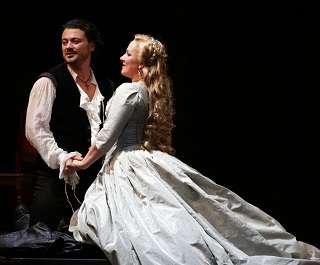|
Back
Romeo & Juliet – The Movie Milano
Teatro alla Scala
01/15/2020 - & January 18, 21, 26, 30, February 2, 13, 16, 2020
Charles Gounod: Roméo et Juliette
Frédéric Caton (Capulet), Vittorio Grigolo (Roméo), Dan-Paul Dumitrescu*/Nicolas Testé (Frère Laurent), Ruzil Gatin (Tybalt), Edwin Fardini (Pâris), Mattia Olivieri (Mercutio), Paolo Nevi (Benvolio), Jean-Vincent Blot (Le Duc de Vérone), Paul Grant (Grégorio), Marina Viotti (Stéphano), Diana Damrau (Juliette), Sara Mingardo (Gertrude)
Chorus of Teatro alla Scala, Bruno Casoni (chorus master), Orchestra of Teatro alla Scala, Lorenzo Viotti (conductor)
Bartlett Sher (stage direction), Michael Yeargan (sets), Catherine Zuber (costumes), Jennifer Tipton, Andrea Giretti (lights), Gianluca Schiavoni (choreography)

V. Grigolo , D. Damrau (© Brescia/Amisano - Teatro alla Scala)
This was a cinematic production of Roméo et Juliette, with impressive duel scenes and a fake Hollywood sensibility. The MET projections of opera in movie theatres with cinematic stagings featuring photogenic singers have accustomed a certain opera public to cinematic values that denature opera, a theatrical tradition. It is a pity that the greatest Italian theatre has resorted to an multinational co-production (MET and Salzburg) utilizing a stage director with little affinity for the operatic tradition nor to European heritage.
Previous productions by Bartlett Sher of operas at the MET have been so contrary to the spirit of the works that I had to see at least a couple of other productions of these same works to delete the hideous memories! Some may think a stage director from another tradition (Broadway, the Circus or Vaudeville) brings a fresh look to opera. Others think it’s akin to having obese ballet dancers; it could be amusing but it is of limited artistic merit.
Michael Yeargan’s sets were functional but invariably somber and uninspiring. On the wedding night, Juliette’s bedroom was in the public square on Tybalt’s funereal shroud. Was it symbolism or just an economy of expenses? The second scene of Act III, where Tybalt is killed, was inspired by today’s Piazza delle Erbe in Verona. Catherine Zuber’s costumes looked ridiculously like those of a production of Giordano’s Andrea Chénier which takes place during the French revolution. A setting in the late 1700s makes no sense, as it is neither the setting of the piece nor Gounod’s time. No attempt was made throughout the production to justify this transposition. In the opening act, the young people were oddly dressed in commedia dell’arte costumes. Perhaps Verona’s geographic proximity to Venice gave this inspiration to the American creators of the production?
The cast was dominated by Italian tenor Vittorio Grigolo, who sounded and looked the young lover. Less convincing was Diana Damrau, who looked more like Juliette’s older sister or even her mother, and whose voice was not ideally suited to the role. It is true that Juliette’s Act I aria “Je veux vivre” is a favourite among coloraturas, but the role is for a lyric soprano capable of singing one coloratura aria. In addition, Damrau sounded tired and cautious on this opening night. An accomplished artist and musician, she managed to be competent and acted as well as she could this unsuited role. At moments, especially late in the opera, her voice was slightly shrill and unappealing. Nonetheless, her “poison aria,” the Act IV “Dieu! Quel frisson court dans mes veines,” was moving and effective. At the end of the aria, she envelops herself in Tybalt’s funeral shroud, an idea with some merit. Both leading roles are quite tiring for the performer, as they sing much of the time. Acts IV and V are basically extended duets. Both Damrau and Grigolo had decent French diction, an unusual accomplishment for an Italian singer. Grigolo’s Act II “Ah! Lève-toi soleil” was brilliantly sung in excellent French. His phrasing of the words “firmament,” “charmant” and “parais” was distinctly Gallic. On the other hand, several of the smaller roles betrayed thick accents. Even the chorus botched the Act II ensemble “Personne, personne.” Strangely enough, they did a fine “Ah jour de deuil” finale to Act III. Perhaps it’s a matter of how much time was spent rehearsing each ensemble.
It was a pleasure to see and hear Sara Mingardo, a veteran baroque singer, in the small role of Gertrude, Juliette’s nurse, a role to which she gave the necessary but measured comic dimension. Most outstanding among the supporting singers was Marina Viotti in the trouser role of the page Stéphano. Interestingly, the Swiss mezzo is the sister of the performance’s conductor, Lorenzo Viotti. Her rendition of “Depuis hier, je cherche en vain mon maître” was elegant, her voice was appealing and she easily convinced one of her being a timid young male through her posture and movement. Curiously, she performed while walking with a crutch. It was thought to be the stage director’s way of rendering the young page vulnerable. However, it turned out that Marina Viotti had had an accident during rehearsals.
Another outstanding performer was the dashing Mattia Olivieri as Mercutio. Endowed with good looks and a commanding stage presence, he sang a charming “Mab, reine des mensonges,” though his diction was not as good as one would have hoped. Least appealing among the supporting singers was the Russian tenor Ruzil Gatin as Tybalt. Though he has a more than decent voice, his French was unconvincing and his deportment far from that of a nobleman. Dan-Paul Dumitrescu, replacing an indisposed Nicolas Testé, was a lacklustre Frère Laurent. Frédéric Caton was a more appealing Capulet. Conductor Lorenzo Viotti led the spirited La Scala Orchestra and showed great affinity for Gounod’s music, which can easily sound drab in less competent hands.
Ossama el Naggar
|